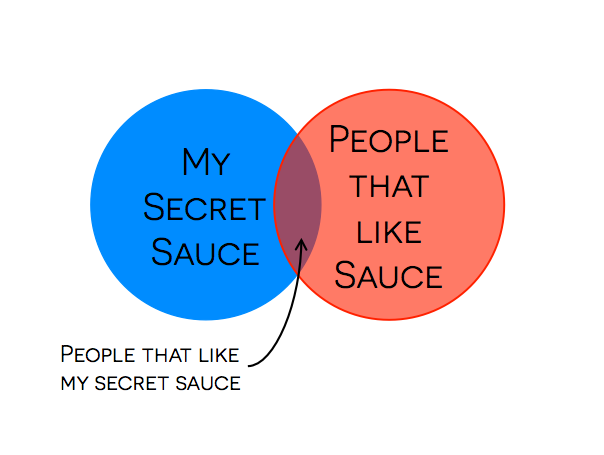For startups, breaking your market up into addressable market segments is important. First of all you have limited money and people to execute programs, therefore you have to focus your efforts on the audience that has the highest probability of purchasing. Secondly, focusing on a segment allows you to build early momentum more easily – awareness and word of mouth builds faster across like-minded groups, and success stories resonate well across a segment of similar prospects.
A key element of your company’s positioning is “Who are you selling to?”. It sounds like a simple question to answer but often for startups, a sloppy market segmentation is the root of a lot of marketing (and ultimately sales) problems.
 When I ask the question “What’s your target market?” I often get an overly simplistic answer like, “SMB’s”. That’s just too big to be a practical target market for a startup. You aren’t going to close business with every single SMB this year are you? Of course not. You are going to close business with a certain kind of SMB. A special snowflake sort of SMB that gets what you do, loves what you do, and will pay money for what you do. You’re going to sell those weirdo, magical, unusual SMB’s that are willing to ignore the fact that you’re small and broke and you’ve never really done this before. What makes those people so strange and awesome? The answer to that question is the key to your segmentation.
When I ask the question “What’s your target market?” I often get an overly simplistic answer like, “SMB’s”. That’s just too big to be a practical target market for a startup. You aren’t going to close business with every single SMB this year are you? Of course not. You are going to close business with a certain kind of SMB. A special snowflake sort of SMB that gets what you do, loves what you do, and will pay money for what you do. You’re going to sell those weirdo, magical, unusual SMB’s that are willing to ignore the fact that you’re small and broke and you’ve never really done this before. What makes those people so strange and awesome? The answer to that question is the key to your segmentation.
“What are the characteristics of prospects that love my unique stuff the most?”
Here are some steps to choosing a good market to target:
- Really get a grip on your key differentiators: There are loads of other alternative for prospects. What makes your offering uniquely different? What can you do that no other competitor can do?
- Take a hard look at the value those differentiators can bring to prospects: You’ve got features that make you different – so what? What is the benefit that users get from those features? How do you measure the value that you deliver? Why do people care about the things that make your offering unique?
- Identify prospects that care about your key differentiators the most: If you look across the broader market, who cares about your value more than the average prospect? Some prospects will says “yeah, your stuff is cool”, but others will jump out of their chair and yell “That’s AMAZING – I need that right now!”. You are going for the second group. Put a different way – this is the group of folks that are the easiest to sell to right now.
- How do I recognize people that have a high affinity for my offering?: Maybe they tend to be a certain size of company, in a certain vertical market, in a certain geography. Maybe they are consumers that already own certain products and also have certain hobbies. This is where you need to get super specific. If you are targeting SMB’s for example, start asking questions – what’s the smallest business that really, really loves this stuff? What’s the largest? Do product businesses love it more that services businesses? Are there locations (urban vs rural) that love it more? Is there a certain type of small business owner that loves it more? Why? Your segmentation will depend you being able to identify the characteristics of an ideal, easy to close prospect.
- Is the segment big enough to meet my sales goals yet not so massive I can’t really target it?: Keeping in mind that you aren’t going to close everyone in your target segment, can you realistically meet your sales goals with just this segment? On the other hand, is the target so massive I can’t expect to get noticed? In my experiences the smaller and tighter you can get on your segmentation, the easier it is to get early traction. You can always go broader later.
- Can the target prospects buy from me? If not, do I have a way to get to the real purchaser?: This last one is important. Can your target prospects afford what you are charging? Do they have budget authority and if not, who do they have to go to for approval? Can they champion your solution inside their business and make a deal happen? Do they generally buy through a channel (retail, resellers, VAR’s, etc.) and if so, can you sell through that channel? Selling is after all, the purpose of this exercise.
If you understand what makes you amazing and can find people that will pay for that amazing stuff, then you have found yourself a nice target market.

